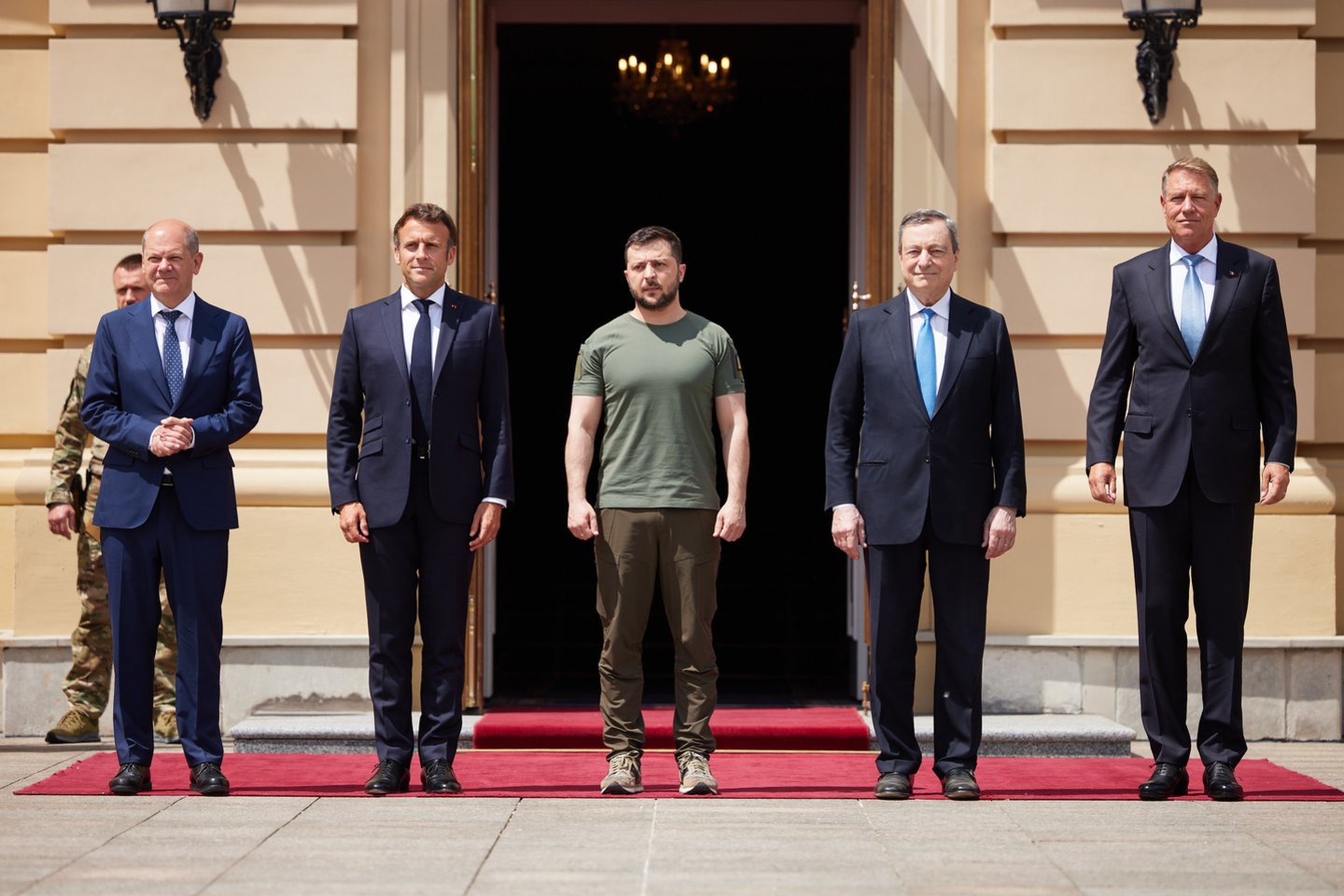It will still have to be crossed and attempts to postpone it will make no difference. It is therefore essential to have as clear a roadmap as possible rather than running away from events, especially those imposed by a hostile malignant will.
This can be seen from the perspective of the global crisis revolving around the war in Ukraine.
Today, Kyiv is to be visited by a distinguished delegation of foreign guests - German Chancellor Scholz, French President Macron and Italian Prime Minister Draghi.
Naturally, speculation has been rife as to what this visit means and what it will bring.
No wonder. In the West (both in the great capitals of Europe and in Washington), the voices of those who call for the war to be stopped as soon as possible in order to avoid further escalation to an open clash between Russia and the West have been loud and clear of sound recently.
This can only be achieved, argue the proponents, by making concessions to the Kremlin regime and its leader, Mr Putin, which would also help him "save face". These concessions include recognising some part of the territory of Ukraine seized by Russia as its own in some slightly diplomatically sugar-coated way, lifting or suspending all or part of new sanctions.
It is in Berlin, Paris and Rome that such voices are particularly loud.
Critics of this approach point out that there is more than one reason for this loud chorus. It is both the unwillingness of a large part of the Western elite to get off the needle of economic and financial relations with the Kremlin regime and the fear of Westerners of entering into open conflict with anyone, let alone a war with Russia.
Moreover, speculation has been rife that the great and old powers of Western Europe are afraid of new geopolitical configurations in the event of a defeat for the Russian regime in Ukraine. In particular, the French and Germans feared that an alliance of central and eastern European countries, the British and the Americans, would take over the reins in Europe.
Voices in some of its potential members are also calling for such an alliance, arguing that the politics of old Europe are bankrupt and that further delay in taking up the fight against the Kremlin is deadly for all. So let those who want to fight to unite.
That is why the visit to Kyiv by the three European leaders has led to speculation that the trio will try to pressure President Zelensky of Ukraine to make concessions to Moscow.
This has been publicly stated, for example, by President Duda of Poland, one of Ukraine's most ardent supporters. He said that such pressure or offers of surrender were absolutely unacceptable to Poland and even less so too Ukraine, as were the attempts by the European powers to negotiate with Moscow behind the backs of Kyiv and its staunchest supporters.
However, it is hard to believe that the three politicians in question would behave as primitively as is feared. Perhaps this visit may be just the thing to show that the talk of betraying Ukraine has no solid foundation and that Berlin, Paris and Rome are just supporting its struggle and its aspirations to become a candidate for European Union membership. This has already been called for by both the European Parliament and the leadership of the European Commission.
But the key point is not what statements will be made today in Kyiv or in other European capitals, but what is happening and will happen on the ground, on the battlefield. This is also what the proponents of the 'ceasefire' are pointing out, rightly claiming that Russia is moving forward, at least in the Donbas, and is likely to achieve its main objectives there - to crush or at least as far as possible to smash the most powerful Ukrainian units, to occupy the whole of the Donetsk and Luhansk regions, and to link the occupied east of the country with the south and Crimea.
Russian forces are completing the capture of the northernmost point of the front, Syverodonetsk in Luhansk.
Mr Zelensky has dramatically described the battle for this town as not only the most brutal but also the decisive battle of the current phase of the war. It seems that Ukraine is facing a similar defeat in Syverodonetsk as in Mariupol.
Having established a bridgehead in the east and south of Ukraine, the Kremlin would be preparing for a new offensive to the south, to Odesa, to recapture the Kharkiv and perhaps even the Kyiv regions, and to continue destroying the whole country with missiles.
It is true that, according to American and British intelligence, Russia does not have the forces to occupy the whole country or much more than the territories it now plans to occupy, especially since the Ukrainian army is successfully counter-attacking in some directions.
But neither the new Western sanctions against Moscow nor the arms to Kyiv have become such factors as to finally stop the Russian forces, let alone crush and expel them from the whole of Ukrainian territory. The reason for this is simple: there are too few weapons and too few sanctions, and there are increasing delays.
In a word, the prospect that Russia, having occupied a part of Ukraine, may destroy the rest of it physically, economically and politically is becoming increasingly real. This is and will be the main objective of the Kremlin regime. It can only be destroyed by much more intensive Western military and economic support for Ukraine and pressure on Russia.
Delays or attempts to pause are and will continue to be costly, not least for Ukraine.
In any case, whichever way the West and Russia's tussle over Ukraine turns, it is clear that the war will become increasingly dramatic.

